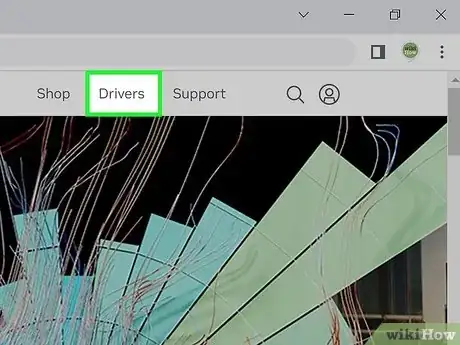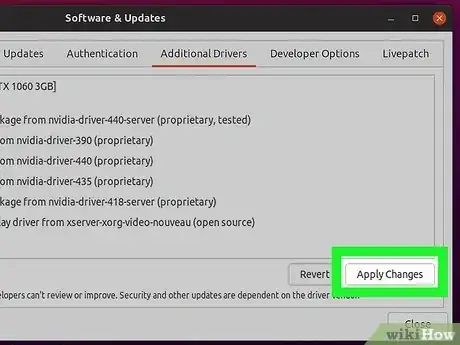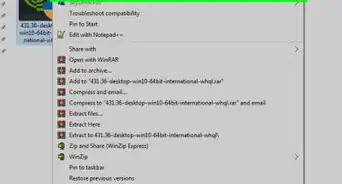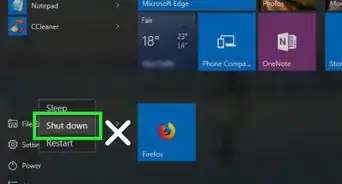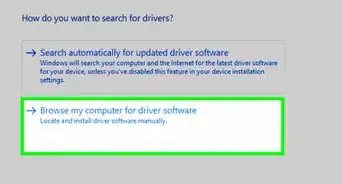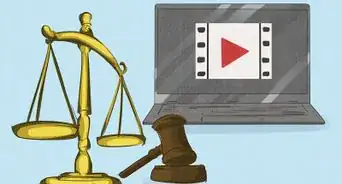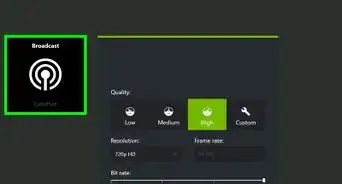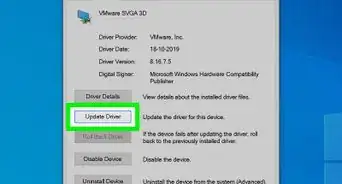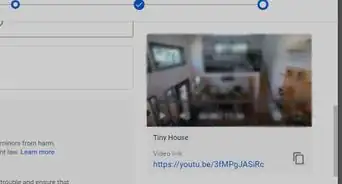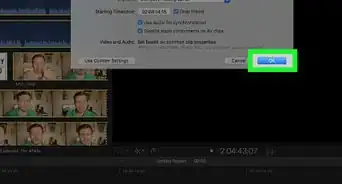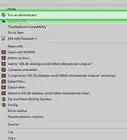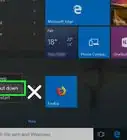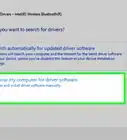This article was co-authored by Stan Kats and by wikiHow staff writer, Travis Boylls. Stan Kats is a Professional Technologist and the COO and Chief Technologist for The STG IT Consulting Group in West Hollywood, California. Stan provides comprehensive technology solutions to businesses through managed IT services, and for individuals through his consumer service business, Stan's Tech Garage. Stan holds a BA in International Relations from The University of Southern California. He began his career working in the Fortune 500 IT world. Stan founded his companies to offer an enterprise-level of expertise for small businesses and individuals.
wikiHow marks an article as reader-approved once it receives enough positive feedback. In this case, several readers have written to tell us that this article was helpful to them, earning it our reader-approved status.
This article has been viewed 835,474 times.
Do you need to update your Nvidia graphics card drivers? Nvidia is constantly updating and patching the underlying software that controls Nvidia graphics cards. Updated drivers are often released every few weeks. Installing the latest drivers will ensure that you get the best performance out of your hardware. You can update your Nvidia drivers manually or using the GeForece Experience. If you are using Ubuntu, you can install and update the Nvidia graphics drivers using the Additional Drivers app. This wikiHow article teaches you how to update your Nvidia drivers.
Things You Should Know
- Update your drivers manually by going to the Nvidia website and downloading the appropriate driver and installing it.
- Download and use the GeForce Experience application to automatically download the appropriate drivers when you download updates.
- To download Ubuntu drivers, open "Additional Drivers" app and select the Nvidia driver. Then click "Apply Changes."
Steps
Manually Updating
-
1Visit the Nvidia GeForce website. You can download the latest drivers from the GeForce website. Navigate to https://www.nvidia.com/ in a web browser.[1]
- You'll need to know what model your Nvidia graphics card is. If you do not know, you can find out what graphics card you have using Device Manager on Windows.
-
2Click the Drivers tab. It's in the upper-right corner of the Nvidia website.Advertisement
-
3Select your graphics card. Use the drop-down menus at the top of the page to select your graphics card. The drop-down menus are as follows:
- Product Type: Use this drop-down menu to select your product type (i.e, GeForce, TITAN, Nvidia RTX, GRID, ION, Legacy, etc).
- Product Series: Use this drop-down menu to select your product series, (i.e, GeForce RTX 40 series, GeForce MX500 series, GeForce 10 series, etc),
- Product: Use this drop-down menu to select your exact graphics card model (i.e, GeForce RTX 4090, GeForce 1080 TI, etc).
- Operating System: Use this drop-down menu to select your operating system (i.e, Windows 11, Windows 10 64-bit, Linux 64-bit). Click Show all operating systems if your operating system is not listed (macOS is no longer supported). [2]
- Download Type: You can choose one of two download types. "Game Ready Drivers" prioritize support for day-of-launch games, patches, and DLC for gamers. "Studio Drivers" prioritize quality and stability for video editing, graphic design, animation, and live streaming.
- Language: Use this drop-down menu to select your language.
-
4Click Search. It's the green button below the drop-down menus. This searches for a graphics card driver for your operating system.
-
5Download the driver installer. To do so, click the green button below the graphics driver information. Then click Download on the next page. You should always download the latest version unless you specifically need an older one. The latest version will often give the best performance.
-
6Run the installer. Double-click the installation file in your web browser or Downloads folder to run the installation file. The installer will automatically remove the old drivers and install the updated ones.
- You will be given the option to do an "Express" installation or a "Custom" installation. Most users can choose the "Express" option during installation.
- Your screen may flicker or go black for a short time during the installation.
-
7Use System Restore if the new driver causes problems. When the driver update is installed, a system restore point will be created automatically. This will allow you to roll your system back to before the driver was installed.
Using the GeForce Experience
-
1Download and install the GeForce Experience program. This is an Nvidia program that manages your Nvidia drivers and game settings. The installer will scan your system for supported hardware. You will likely encounter an error during installation if you don't have an Nvidia graphics card installed or are using an older product.[3] Use the following steps to download and install GeForce Experience:
- Go to https://www.nvidia.com/en-us/geforce/geforce-experience/ in a web browser.
- Click Download now.
- Double-click the installation file in your web browser or Downloads folder.
- Click Yes if prompted.
- Click Agree and Install.
-
2Launch the program after the installation has been completed. Once the installation is complete, GeForce Experience should launch automatically. If it doesn't, you can click the GeForce Experience launcher in the Windows Start menu.
-
3Allow GeForce Experience to update. When you start GeForce Experience, it will check for any available updates. If GeForce Experience needs to update, allow a few minutes for it to do so.
-
4Click the Driver tab. It's in the upper-left corner. Any available driver updates will be displayed. Click the "Check for updates" button if GeForce Experience hasn't checked recently.
- Once you have the application installed, you'll be automatically notified when new drivers are released.[4]
-
5Click the Download button if an update is available. It's the green button at the top of the page, next to the latest driver version.[5]
-
6Click the Express Installation button. It's the green button that appears when the download is complete. The Express Installation option should be fine for most users. Advanced users can choose the Custom option.
- The custom installation will allow you to choose which of the drivers you want to install.
-
7Wait for the driver to install. GeForce Experience will handle all of the installation work. Your screen may flicker or shut off for a moment during installation.
-
8Use System Restore if the new driver causes problems. When the driver update is installed, a system restore point will be created automatically. This will allow you to roll your system back to before the driver was installed.
Updating Ubuntu Drivers
-
1Click the Dash . It's the icon with 9 tiny squares. It is in the dock that is on the left side by default.
- If you are using another version of Linux you'll need to download the appropriate driver for your Linux distribution and install it using the Terminal.
-
2Type drivers in the search bar. The search bar is at the top of the Dash windows.
-
3Click Additional Drivers. It has an icon that resembles a circuit board. This opens the Additional Drivers window.
-
4Wait for the list of available drivers to load. This may take a few moments.
-
5Select the latest driver from the list. Click the radio option next to the Nvidia drivers. Make sure it is the driver from Nvidia, and not the "Nouveau" driver. Select the driver to begin downloading the files.
-
6Click the Apply Changes button. It's below the window that lists all the available drivers. The Nvidia driver will be installed. Your screen may flicker or shut off during the installation process.
-
7Reboot your computer. Reboot your computer to complete the installation process.[6]
Expert Q&A
-
QuestionWhat can I do if I can't update my Nvidia driver on Windows 10?
 Stan KatsStan Kats is a Professional Technologist and the COO and Chief Technologist for The STG IT Consulting Group in West Hollywood, California. Stan provides comprehensive technology solutions to businesses through managed IT services, and for individuals through his consumer service business, Stan's Tech Garage. Stan holds a BA in International Relations from The University of Southern California. He began his career working in the Fortune 500 IT world. Stan founded his companies to offer an enterprise-level of expertise for small businesses and individuals.
Stan KatsStan Kats is a Professional Technologist and the COO and Chief Technologist for The STG IT Consulting Group in West Hollywood, California. Stan provides comprehensive technology solutions to businesses through managed IT services, and for individuals through his consumer service business, Stan's Tech Garage. Stan holds a BA in International Relations from The University of Southern California. He began his career working in the Fortune 500 IT world. Stan founded his companies to offer an enterprise-level of expertise for small businesses and individuals.
Professional Technologist You can always go to Nvidia's website and download the drivers directly from them. If Windows isn't letting you update the driver though, it's probably because it's already up to date. There simply may not be an update you need.
You can always go to Nvidia's website and download the drivers directly from them. If Windows isn't letting you update the driver though, it's probably because it's already up to date. There simply may not be an update you need. -
QuestionWhat is GeForce Experience? Can I uninstall it?
 Stan KatsStan Kats is a Professional Technologist and the COO and Chief Technologist for The STG IT Consulting Group in West Hollywood, California. Stan provides comprehensive technology solutions to businesses through managed IT services, and for individuals through his consumer service business, Stan's Tech Garage. Stan holds a BA in International Relations from The University of Southern California. He began his career working in the Fortune 500 IT world. Stan founded his companies to offer an enterprise-level of expertise for small businesses and individuals.
Stan KatsStan Kats is a Professional Technologist and the COO and Chief Technologist for The STG IT Consulting Group in West Hollywood, California. Stan provides comprehensive technology solutions to businesses through managed IT services, and for individuals through his consumer service business, Stan's Tech Garage. Stan holds a BA in International Relations from The University of Southern California. He began his career working in the Fortune 500 IT world. Stan founded his companies to offer an enterprise-level of expertise for small businesses and individuals.
Professional Technologist It's definitely optional, so feel free to uninstall it if you'd like. It's a program that offers a bunch of customization options. It's helpful to have if you do any kind of PC gaming, but your drivers will be fine if you uninstall it.
It's definitely optional, so feel free to uninstall it if you'd like. It's a program that offers a bunch of customization options. It's helpful to have if you do any kind of PC gaming, but your drivers will be fine if you uninstall it. -
QuestionHow do I turn off the GeForce notifications?
 Stan KatsStan Kats is a Professional Technologist and the COO and Chief Technologist for The STG IT Consulting Group in West Hollywood, California. Stan provides comprehensive technology solutions to businesses through managed IT services, and for individuals through his consumer service business, Stan's Tech Garage. Stan holds a BA in International Relations from The University of Southern California. He began his career working in the Fortune 500 IT world. Stan founded his companies to offer an enterprise-level of expertise for small businesses and individuals.
Stan KatsStan Kats is a Professional Technologist and the COO and Chief Technologist for The STG IT Consulting Group in West Hollywood, California. Stan provides comprehensive technology solutions to businesses through managed IT services, and for individuals through his consumer service business, Stan's Tech Garage. Stan holds a BA in International Relations from The University of Southern California. He began his career working in the Fortune 500 IT world. Stan founded his companies to offer an enterprise-level of expertise for small businesses and individuals.
Professional Technologist You should be able to do that in the program's settings, but if GeForce Experience is causing notifications to pop up, they're worth looking at. They may be letting you know your graphics settings aren't optimized, or they may be letting you know there's an update you need.
You should be able to do that in the program's settings, but if GeForce Experience is causing notifications to pop up, they're worth looking at. They may be letting you know your graphics settings aren't optimized, or they may be letting you know there's an update you need.
References
- ↑ Stan Kats. Cybersecurity Expert. Expert Interview. 24 June 2021.
- ↑ https://appleinsider.com/articles/19/01/18/apples-management-doesnt-want-nvidia-support-in-macos-and-thats-a-bad-sign-for-the-mac-pro
- ↑ Stan Kats. Cybersecurity Expert. Expert Interview. 24 June 2021.
- ↑ Stan Kats. Cybersecurity Expert. Expert Interview. 24 June 2021.
- ↑ Stan Kats. Cybersecurity Expert. Expert Interview. 24 June 2021.
- ↑ https://help.ubuntu.com/community/BinaryDriverHowto/Nvidia
About This Article
1. Open the Windows search bar.
2. Type dxdiag and press Enter.
3. Click Display and write down your ″chip type.″
4. Go to geforce.com in a web browser.
5. Click Drivers.
6. Search for your drivers.
7. Download the drivers.
8. Run the downloaded file to update.


